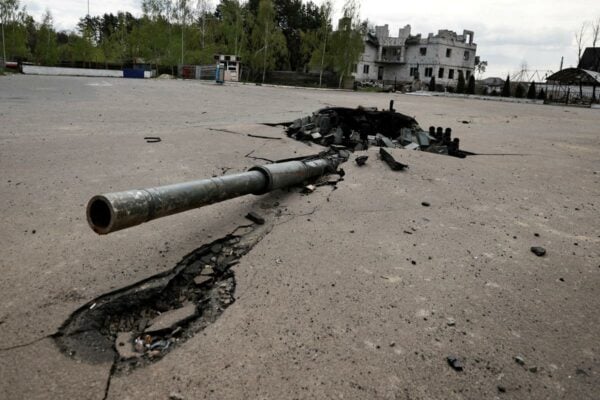
A Turret from a T-72 tank buries itself in concrete after suffering a catastrophic explosion and separating from its hull.
One of the biggest determinants on how the war in Ukraine will progress is closely tied to the amount of support each side in receiving by way of weapons and ammunition. While Russia is seeking allies to supply it with additional arms while pushing their arms producers to renovate and create more tanks and munitions, Ukraine’s NATO allies are also seeking further production and funding. The limit Ukraine’s allies have is that much of their advanced equipment is running low, even among NATO stockpiles, and require a lot of political support. The creation and distribution of newly formed arms for Ukraine is tied to the national economies of their allies, paid and supported by citizens in those countries. While support for defending Ukraine against Russia has been high, there is always a natural end of these phases of support. The end of these policy honeymoons are often accompanied by dwindling discussions and information on the conflict or issue, no matter how horrific the conflict might be.
The world during 2014 was an example of how some conflicts are given attention, while others are often avoided or outright ignored after a period of time. The conflict in Ukraine in 2014 was not a major event for people outside of Europe after the initial period, even after an airliner was shot down as part of the conflict in the East of Ukraine by an Anti-Aircraft system supplied by Russia. The war in Syria that bled into Iraq did initially receive a lot of attention due to the extreme violence, but even that conflict was eventually ignored, even when refugees in Western countries were being threatened by ISIS fighters in the middle of Western cities. Even natural disasters have been ignored, with Haiti’s natural disaster illiciting a lot of funding without long term solutions, with many still living in temporary shelter many years later. Afghanistan is currently experiencing this lack of policy attention, and the recent earthquake in Turkey and Syria was major news abroad for only about a week it seems.
While the end result of conflict in Ukraine in 2014 and mistakes made in Afghanistan more recently created many of the current problems, the level of attention given to these policy issues are often intentionally managed. This is not done by the degree of importance, but by the advantage an issue might give a small interest group in pursuing their larger goals, even if it has negative long term consequences. This management of attention of policy issues can help a cause, but in many cases it develops into a strategy to ignore serious issues for the sake of unserious discussions. This might be the biggest threat to Ukraine at the moment, but it is also a major threat to many innocent people worldwide when English language media go into their honeymoon management mode, picking and choosing who is saved and who is intentionally given up on. Some might say it is just politics, but if your politics is intentionally hurting others, it is simply negligence.